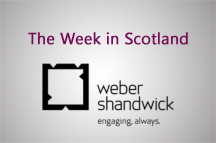Tragedy in Glasgow
.jpg) Scottish politicians came together this week following the tragic events in Glasgow on Friday night. As news emerged that a police helicopter had crashed into the Clutha Vaults bar in the city centre, it was clear that the week ahead would be dominated by the unfortunate accident that had occurred by the banks of the river Clyde.
Scottish politicians came together this week following the tragic events in Glasgow on Friday night. As news emerged that a police helicopter had crashed into the Clutha Vaults bar in the city centre, it was clear that the week ahead would be dominated by the unfortunate accident that had occurred by the banks of the river Clyde.
Politicians set aside their differences to lend support to the rescue efforts and to praise the bravery of the emergency services as well as the people of Glasgow, who rallied together to help those affected by the accident.
Autumn Statement
Returning to the regular political schedule, this week saw the annual political set piece that is the Autumn Statement. In Scotland, the Chancellor said that the Scottish Government would benefit from an extra £308 million over the next two years, meaning that Holyrood’s budget will be cut by only around 0.2% overall. This compares to an average cut of 1.1% for most UK Government departments, according to Number 10.
In addition, Mr Osborne committed not only to a new tax allowances scheme, aimed at encouraging investment in shale gas by reducing tax on early profits by 50%, but also to delivering £10m for the establishment of the Higgs Centre for Theoretical Physics at Edinburgh University.
The Scottish Government’s Cabinet Secretary for Finance and Sustainable Growth, John Swinney, responded that the Coalition’s failed economic policy had deepened the challenge of delivering a real return to growth and noted that Scotland will see cuts to public spending for years to come.
In the long run, it will be interesting to see how the Scottish Government responds to the shale gas incentive as Scotland starts weighing up the risks and benefits of exploring the country’s significant potential in this area.
White Paper
The main issue on the political agenda remains the referendum. Having now had a week to digest its content, it’s clear that the analysis of the White Paper will continue for many weeks to come.
Beyond the headline grabbing politics of the launch, Weber Shandwick’s Digital Strategist Craig McGill has been crunching the data to see who the social media winners of the White Paper have been, and the answer is quite surprising. Analysis of the tweets, social media activity and most popular hashtags in the 24 hours after the launch show it to be… a group of U.S. X Factor rejects.
By sheer bad luck the #bettertogether hashtag – one of the three main hashtags used in the #indyref debate – saw itself being hijacked by the girl band Final Harmony, who were launching a new album called “Better Together” just as Alex Salmond was taking to the podium in Glasgow.
The girl band pulled in more online impressions than any other online outlet except for the BBC News – and they were the most retweeted of all the tweets with a Scottish politics relevant hashtag. To add insult to injury, their link was shared twice as much as the scotreferendum.com web link, which pulled in just 514 shares.
Away from the band, the BBC were indeed the clear Twitter winners with Norman Smith (@BBCNormanS) and BBC Scotland News (@BBCScotlandNews) receiving the most online exposure – with Norman Smith’s tweet quoting Nicola Sturgeon saying Trident would be removed “as soon as possible” being the winner overall with 2.3milliion Twitter impressions. Better Together (@UKtogether) were the second most retweeted account (92 retweets) with Yes Scotland (@YesScotland) coming in third (67 retweets).
But surely the most depressing stat around all the activity is that only 8,400 Twitter accounts in total talked about the White Paper launch. When you consider there are more than 50,000 active accounts in Scotland and that this was the most significant announcement in the independence debate so far, perhaps there’s more referend-um types than people thought.
Conor Magowan
Director, Public Affairs - Weber Shandwick Scotland












